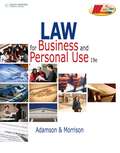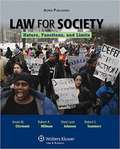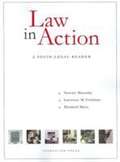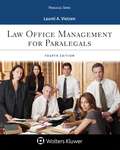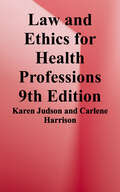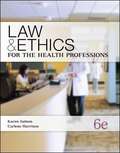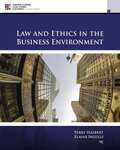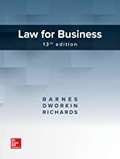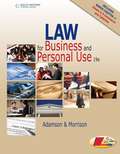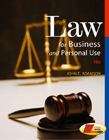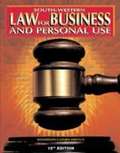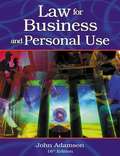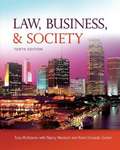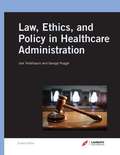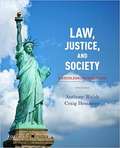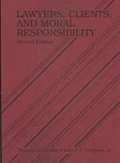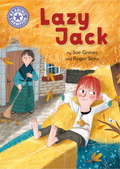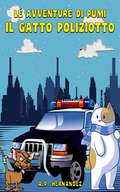- Table View
- List View
Law For Business And Personal Use
by John Adamson Amanda MorrisonExplore the foundations of business law as well as the application of legal concepts to everyday life. LAW FOR BUSINESS AND PERSONAL USE, 19E, combines strong content and interactive technology with consistent, proven instruction to maintain student interest and support active learning. Coverage includes contracts, criminal law, environmental law, family law, and consumer protection. With more than 1,000 cases, LAW FOR BUSINESS AND PERSONAL USE, 19E, offers plenty of opportunities for case analysis and research.
Law For Society: Nature, Functions, And Limits
by Katherine A. Currier Robert S. Summers Robert A. Hillman Sheri Lynn Johnson Kevin M. ClermontLaw for Society: Nature, Functions, and Limits offers an illuminating conceptual framework that looks at five basic legal instruments with which the law addresses the problems and goals of society. For any Introduction to Law course or as secondary reading in political science, criminal justice, or general studies, Law for Society breaks down the very concept of law to answer the questions: What is law? How does law work? What can law do and not do? The book addresses the nature of law, its problem-solving functions, and the limits on what law can accomplish.
Law In Action: A Socio-Legal Reader
by Lawrence M. Friedman Elizabeth Mertz Stewart MacaulayThis text is designed for law students and for courses in legal studies programs. The reader deals in depth with the relationship between the legal system and its surrounding society, including such classic issues as the social sources of law and the impact of legal rules and institutions on society. Other chapters examine the role of judges and lawyers in the system and how culture and historical tradition help mold the legal systems of various societies. The book contains six chapters, each containing classic and contemporary readings on these subjects, with extensive notes and questions to guide the student.
Law Office Management For Paralegals (Aspen Paralegal)
by Laurel A. VietzenLaw Office Management for Paralegals, Fourth Edition is a comprehensive introduction to law office management, emphasizing ethics, law office culture, law office systems, and “soft skills,” such as communications and critical thinking. Assignments are drawn from real-world law office management situations and supported by innovative visual aids and learning tools. Students get hands-on practice with timekeeping, conflicts-checking, file management, trust accounting, business planning, correspondence, and much more. They are exposed to law office software, such as Clio, and learn to perform vital functions using other software and even freeware. Career profiles emphasize the importance of involvement in professional organizations, advancement in the legal field without obtaining a law degree, and that the legal profession is populated by men and women of all ages and backgrounds. New to the Fourth Edition: New ethical discussions: the obligation to keep up with current technology, disaster planning, and dealing with clients using crowdfunding. New technology discussions: artificial intelligence in legal practice, online notarization, client portals, and apps to make the practice of law more efficient and mobile. New discussions of law as a business: features of property insurance, malpractice insurance, insurance for and on employees; trends in office space. New soft skills discussions: dealing with incivility in the legal profession, managing staff through technology changes. Professors and students will benefit from: Author Laurel A. Vietzen’s outstanding reputation in the paralegal market. Drawing on her extensive background as a professor and practitioner, she clearly presents basic law office management and organization. Well-crafted assignments throughout the text help students hone practical skills such as critical thinking, organization, general communication, and computer proficiency. The text is particularly adaptable for an online or hybrid class.
Law Relating to Computers Internet and E-Commerce
by Nandan KamathLaw Relating to Computers, Internet + E-Commerce by Nandan Kamath is a comprehensive legal treatise that addresses the challenges and complexities posed by the digital revolution. It serves as an essential guide to understanding India’s cyber laws, particularly the Information Technology Act, 2000, along with its associated rules, regulations, and amendments. The book explores key legal concerns in cyberspace including electronic contracts, digital signatures, data privacy, cybercrimes, domain name disputes, and intellectual property rights. It provides insights into emerging issues like cyberstalking, cyberporn, and the taxation of e-commerce, supported by detailed case law and international perspectives. With contributions from legal scholars and students, and a foreword by Prof. N.R. Madhava Menon, this updated fifth edition remains an authoritative resource for lawyers, IT professionals, policymakers, and students navigating the intersection of law and technology in the digital age.
Law and Ethics for Health Professions
by Karen Judson Carlene HarrisonThis book explains how to navigate the numerous legal and ethical issues that health care professionals face every day. Topics are based upon real-world scenarios and dilemmas from a variety of health care practitioners. In the ninth edition, material has been revised to reflect the current health care environment. <p><p>As students progress through the text, they will get the opportunity to use critical thinking skills to learn how to resolve real-life situations and theoretical scenarios and to decide how legal and ethical issues are relevant to the health care profession in which they will practice.
Law and Ethics for the Health Professions (6th Edition)
by Karen Judson Carlene HarrisonLaw & Ethics for the Health Professions, sixth edition, provides an overview of the laws and ethics you should know to help you give competent, compassionate care to patients that is also within acceptable legal and ethical boundaries. The text can also serve as a guide to help you resolve the many legal and ethical questions you may reasonably expect to face as a student and, later, as a health care practitioner.
Law and Ethics in the Business Environment
by Terry Halbert Elaine IngulliBlend theory with practical applications as LAW AND ETHICS IN THE BUSINESS ENVIRONMENT, 9E presents current controversial issues at the intersection of business, law, and ethics. <p><p>Using an engaging, student-friendly in tone, this edition encourages lively classroom debate on pertinent topics, from climate change to the gig economy to telematic surveillance to transgender workplace rights. The organization and support within this edition make is easy to present topics and encourage insightful thinking. Specific prompts and meaningful assignments engage students and create an interactive classroom environment. <p><p>The authors complete each case and reading with questions that guide students in applying their knowledge in new scenarios as they sharpen critical thinking skills. Projects at the end of each chapter vary from role play and mock trials to negotiation exercises.
Law for Business
by Eric L. Richards A. James Barnes Terry Morehead DworkinBusiness Law 10/e has provided students with a comprehensive, yet concise treatment of the legal issues of fundamental importance to business students and the business profession. The cases, which have always been a strong feature, are edited and re-written by the authors, who divide the material into three categories: facts, issues, decisions. The authors, Barnes, Dworkin, and Richards, choose cases that are appropriate to explain precedent and history as well as include “hot topic” cases that relate to current events. In addition to case applications, the authors use such techniques as content summaries to apply concepts to practice. Effective managers and employees must develop knowledge of both law and business because people involved in business also are involved in, and greatly affected by, the laws concerning business.
Law for Business and Personal Use
by John E. AdamsonAdamson (business, Southwest Missouri State University) outlines the U. S. legal system and explains how various laws apply to the rights and duties of small businesses. The 32 chapters discuss civil procedure, contract law, leasing of real property, wills and trusts, employment law, legal forms of business organization, and financial transactions. Annotation ©2006 Book News, Inc. , Portland, OR (booknews. com)
Law for Business and Personal Use
by John E. Adamson Norbert J. MietusThis 15th edition of Law for Business and Personal Use maintains a fundamental emphasis on business law, while introducing personal law topics that interest students. Give your students the most comprehensive coverage of contracts, ethics, employment law, credit, banking, partnerships, bankruptcy, etc.
Law for Business and Personal Use (16th edition)
by John E. AdamsonAdamson (business, Southwest Missouri State University) outlines the U. S. legal system and explains how various laws apply to the rights and duties of small businesses. The 32 chapters discuss civil procedure, contract law, leasing of real property, wills and trusts, employment law, legal forms of business organization, and financial transactions.
Law for Entrepreneurs
by Jethro K. Lieberman Don Mayer Daniel M. Warner George J. SiedelMayer, Warner, Siedel and Lieberman's Law for Entrepreneurs is an up-to-date textbook that covers the broad spectrum of legal issues that entrepreneurs must understand when starting and running a business. The text is organized to permit instructors to tailor the materials to their particular approach. The authors take special care to engage students by relating law to everyday events with their clear, concise and readable style. After introductory chapters covering the legal environment of business, Law for Entrepreneurs provides students with context and essential legal concepts relating to contracts, product liability, intellectual property, insurance, agency law, partnerships, corporations, and employment law. The text provides the vocabulary and legal savvy that entrepreneurs need to talk in an educated way to customers, suppliers, employees, creditors, shareholders, government regulators and other stakeholders — and to their own lawyers. With Law for Entrepreneurs, the authors have created a text that not only has both case summaries and excerpted cases, but one that you can easily customize by deleting chapters, reordering the content, adding your own material, and even editing at the line level with Flat World's easy-to-use MIYO (Make It Your Own) Platform. The free online version of the text includes embedded links to law-related videos at YouTube and other online sites for easy access by students and instructors.
Law of Asylum in the United States (2013 Edition)
by Deborah E. AnkerLaw of Asylum in the United States is a classic and comprehensive presentation of U.S. asylum law. It describes and interprets applicable U.S. laws, as well as numerous international sources, and provides detailed discussions of all aspects of asylum and refugee law, including: The meaning of well-founded fear and persecution; The five grounds (race, religion, nationality, social group membership, and political opinion); Withholding of removal protection and protection under the Convention Against Torture; Claims based on childhood status and gender-based persecution; When non-state actors can be considered agents of persecution; Asylum eligibility for those fleeing gang violence in their home countries; Elements of proof; Credibility determinations and Recent changes in statutory language enacted with the REAL ID Act.
Law of Commercial Transactions
by Jethro K. Lieberman Don Mayer Daniel M. Warner George J. SiedelMayer, Warner, Siedel and Lieberman's Law of Commercial Transactions is an up-to-date textbook that covers legal issues that students who engage in commercial transactions must understand. The text is organized to permit instructors to tailor the materials to their particular approach. The authors take special care to engage students by relating law to everyday events with their clear, concise and readable style.
Law's Empire
by Ronald M. DworkinWith the incisiveness and lucid style for which he is renowned, Ronald Dworkin has written a masterful explanation of how the Anglo-American legal system works and on what principles it is grounded. Law's Empire is a full-length presentation of his theory of law that will be studied and debated--by scholars and theorists, by lawyers and judges, by students and political activists--for years to come. Dworkin begins with the question that is at the heart of the whole legal system: in difficult cases how do (and how should) judges decide what the law is? He shows that judges must decide hard cases by interpreting rather than simply applying past legal decisions, and he produces a general theory of what interpretation is--in literature as well as in law--and of when one interpretation is better than others. Every legal interpretation reflects an underlying theory about the general character of law: Dworkin assesses three such theories. One, which has been very influential, takes the law of a community to be only what the established conventions of that community say it is. Another, currently in vogue, assumes that legal practice is best understood as an instrument of society to achieve its goals. Dworkin argues forcefully and persuasively against both these views: he insists that the most fundamental point of law is not to report consensus or provide efficient means to social goals, but to answer the requirement that a political community act in a coherent and principled manner toward all its members. He discusses, in the light of that view, cases at common law, cases arising under statutes, and great constitutional cases in the Supreme Court, and he systematically demonstrates that his concept of political and legal integrity is the key to Anglo-American legal theory and practice.
Law, Business and Society (Tenth Edition)
by Tony McadamsDon't Just Learn the Law, Learn the Law in Context! In the tenth edition of Law, Business, and Society, Tony McAdams discusses the role of the market, ethics/social responsibility, and the law in regulating the complex relationship between business and the larger society. McAdams examines whether the market and ethics/social responsibility have failed, and if government intervention is needed to maintain a healthy relationship between business practice and society's general welfare. The text serves as a general introduction to the legal system, including chapters on constitutional law, the common law of contracts and torts, and employment law. The closely written narrative, edited law cases, contemporary vignettes from daily life and an abundance of thought-provoking questions help convey key points. In addition, Law, Business, and Society precisely conforms to AACSB International accreditation expectations.
Law, Ethics, and Policy in Healthcare Administration
by George PozgarThis chapter provides the reader with an overview of ethics, moral principles, virtues, and values. The intent here is not to burden the reader with the philosophical arguments sur¬rounding ethical theories, morals, and principles; however, as with the study of any new sub¬ject, "words are the tools of thought." The reader who thoroughly absorbs and applies the content of the theories and principles of ethics discussed herein will have the tools necessary to empathize with and guide patients through the conflicts they will face when making dif¬ficult care decisions. Therefore, some new vocabulary is a necessary tool, as a building block for the reader to establish a foundation for applying the abstract theories and principles of ethics in order to make practical use of them.
Law, Justice, and Society: A Sociolegal Introduction
by Craig Hemmens Anthony WalshAn accessible and lively introduction to the field, Law, Justice, and Society: A Sociolegal Introduction, Fifth Edition, explores the relationship between legal systems and other social institutions using a distinctive sociological point of view. Anthony Walsh and Craig Hemmens provide detailed discussions of the various ways in which law impacts people based on race, class, gender, and age while also introducing students to the origins of the law, the history and development of the American legal system, the sociology of law, court structure, and the difference between civil and criminal law.
Lawyers, Clients and Moral Responsibility (2nd Edition)
by Robert F. Cochran Thomas L. ShafferThis second edition of the authors influential LAWYERS, CLIENTS, AND MORAL RESPONSIBILITY explores the place of moral and social values in the law office with the use of engaging stories, dialogues and discussion. The book presents a practical way for lawyers to raise and discuss moral issues with clients. It will serve as an engaging supplement to professional responsibility, client-counseling, and legal clinic courses. This second edition adds substantial discussion of the place of moral discourse within law firms and corporations, ways to engage the powerless client in moral discourse, and the place of social justice in client counseling.
Lazy Jack: Independent Reading Purple 8 (Reading Champion #173)
by Sue GravesIn this modern adaptation of an Old English story, Jack's mother orders her lazy son to find a job. But each job Jack tries seems to end in disaster... Reading Champion offers independent reading books for children to practise and reinforce their developing reading skills.Fantastic, original stories are accompanied by engaging artwork and a reading activity. Each book has been carefully graded so that it can be matched to a child's reading ability, encouraging reading for pleasure.
Le Avventure di Pumi, il Gatto Poliziotto: Libri per bambini. Lettura dai 6-7 ai 10-11 anni.
by A. P. HernándezPumi è un gatto molto particolare. A differenza dei suoi fratelli, che amano cacciare, graffiare i cuscini del divano e fare grandi corse, a Pumi piace guardare le stelle, porre domande senza risposta e, soprattutto, fare giustizia. Da grande, Pumi vuole diventare un cane poliziotto, motivo per cui chiede l'aiuto a Ton, un topo di biblioteca che gli insegnerà a leggere e a scrivere. Ma le cose non sono così semplici come sembrano. Nella sua carriera per entrare nelle forze di polizia, Pumi si ritrova in un mondo governato da cani e da pregiudizi, dove i gatti, per quanto coraggiosi, non hanno posto. Gli ostacoli che si interpongono sul suo cammino metteranno alla prova la sua persistenza, la sua forza e la sua ostinazione, aprendo al contempo l'opportunità di incontrare amici e vivere grandi avventure. Libro per bambini. Lettura dai 6-7 ai 10-11 anni.
